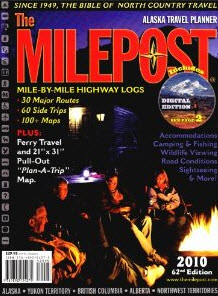Stan Trof asked:
WHAT TO SEE, TO DO AND WHERE: Mount McKinley is the highest mountain in North America (6,194 m or 20,306 feet), 150 miles from Fairbanks. Mountain climbing season is very short because of cold weather, strong winds and avalanche hazards. Nearly 1,000 people each season attempt the mountain, the best climbing conditions are in June.The peak is located in Denali National Park that offers superb mountain scenery and incomparable wildlife viewing, from 400-kg (900 lbs) grizzlies to Alaska state birds, willow ptarmigans, from Dall sheep to porcupines.
Many visitors come to Alaska in winter to see Aurora Borealis when Northern Lights glow in all its glory. Birdwatching is also very popular among Alaska visitors, over 250 bird species inhabit the area, especially the southwest region. You can find all Alaska nature watch viewing sites including detail maps here. Whale watching boat trips allow the visitors an opportunity to observe and photograph Beluga, Orca, Humpback and Gray whales, along with many other marine mammals, in their natural environment. Available Alaska whale watching tours are listed by geographic region here. There many miles of trails for backpackers- from the pristine glaciers and fjords of remote Wrangell-St Elias National Park to the famous Chilkoot Trail where you follow the footsteps of the Klondike gold prospectors on this demanding 33-mile route near Skagway. It is a difficult hike and usually takes three to five days.
The Alaska Trail system has over 40 both land and water-based trails with recognized recreational, scenic, and historic value. If you travel by RV or motorcoach, you need to know where to camp. Alaska RV parks index comes in handy.
Do not also forget to visit Talkeetna – every Alaska visitor’s favorite small town is the base for superb flightseeing trips around Mount McKinley. Alaska’s capital Juneau is worth seeing. Founded as a roughneck mining town in 1880, Juneau is very much urbane these days. The city is also close to breathtaking glacier lookouts. If you enjoy driving, challenge the lonely Dalton Highway , a 500-mile road leading from Fairbanks to the Arctic Ocean. On the way you can try recreational gold panning on any Federal stream segments along the Dalton highway south of Atigun Pass. For those looking for downhill skiing opportunities, Alyeska Ski Resort, located 40 miles south of Anchorage, offers 3 double chairs, 2 fixed quads, 1 high-speed detachable quad and a 60-passenger tram to move you 840 m (2,800 feet) above scenic landscapes. For cross-country skiing fans Alaska’s many trails are available to trek through mountain valleys or to ski beside the ocean.
Annual sled dog races (dog mushing) is Alaska’s official sport that attract participants and spectators from all over the world. The most famous race, Iditarod, runs for 1680 km (1,049 miles) from Anchorage to Nom and lasts 9 days starting on the first Saturday in March. Throughout the year many Alaska’s communities host festivals and carnivals, there are interesting events for everyone. One of them is World Ice Art Championships held at Fairbanks in February-March where competitors carve magnificent sculptures from blocks of ice. Among other outdoor activities we would like to mention are boating on Alaska waterways, snowmachining and ATV-ing. We also devoted three separate web pages to Alaska Sport Fishing , Hunting and Cruises.
WHEN TO GO: Alaskan summers are cool, the average temperature is +14 deg.C (58 F) in summer and -12 deg.C (11 F) in winter. It receives midnight sunshine in May- July and goes into 24-hour darkness during the part of winter. May to September are the best months to visit for warm time activities. You can check next week weather forecast for Anchorage here.
GETTING THERE: There are many direct or one-stop flights from major US cities. The largest Alaska’s city, Anchorage, is under 4 hours from Seattle by air. Anchorage is 2,463 road miles from Seattle, 3,608 miles from Los Angeles. It is more convenient to fly to Anchorage and rent a car or RV on the spot. To travel by water you can take a cruise to Alaska or use the Alaska Marine Highway Ferry.
TRAVEL TIPS: Northern weather can be unpredictable. Consider taking with you and wearing multiple layers of clothes in response to a wide variety of temperatures and weather conditions. Alaska is more expensive than most other states: apart from two dozen hostels there’s little budget accommodation, and eating and drinking will set you back at least twenty percent more than in the Lower states. Still, experiencing Alaska on a low budget is possible, though it requires planning and off-peak travel. From June to August room prices are very high. May and September, when tariffs are relaxed and the weather only slightly chillier, are just as good times to go, and in April or October you’ll have the place to yourself, together with a smaller range of places to stay and eat. Winter months are becoming increasingly popular, particularly for the spectacular aurora borealis . At this time of year hotel rates drop by as much as half.
We wish you a nice and safe trip!

